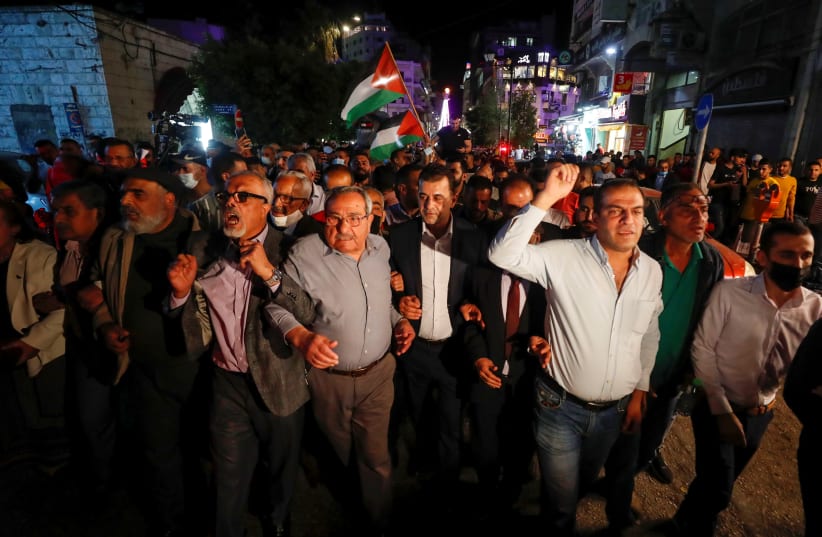With tensions boiling in the West Bank, the IDF has beefed up its forces following a terrorist attack and in anticipation of a month in which several flashpoint events are set to take place.
Three yeshiva students were wounded in the shooting attack Sunday afternoon at Tapuah junction in Samaria. Two of them are in critical condition.
The IDF had already bolstered troop deployments for Ramadan out of caution that violence might erupt. But that did not stop a terrorist from pulling up to a bus stop and firing at civilians before fleeing the scene.
In an attempt to prevent copy-cat attacks and to help in the manhunt for the attacker, the military on Sunday night said an additional battalion and special forces would be deployed to the area.
But is that enough?
Starting with Jerusalem Day and Laylat al-Qadr next Sunday, followed by Eid al-Fitr on Wednesday, Quds Day on Friday and Nakba Day on Saturday, and compounded by the cancellation of the Palestinian elections and the eviction of dozens of Palestinians from their homes in east Jerusalem, police and the IDF must be on high alert for clashes and additional attacks.
As it tends to do when tensions are high, the IDF also is on alert for violence from the Hamas-run Gaza Strip. Last week, more than 36 rockets were fired toward southern Israel from the blockaded coastal enclave.
IDF Central Command has been on guard for attacks by Hamas supporters in the West Bank, where the PA was at risk of losing power to the Islamist group had elections taken place.
Hamas called the cancellation of the elections a “coup.” But according to Walla, the terrorist group has decided to delay its response to the cancellation following the tragedy at Mount Meron. Instead, Hamas is expected to try to provoke riots during Jerusalem Day and Eid al-Fitr later this week, the report said.
No group has claimed responsibility for the terrorist attack on Sunday. But it was praised by many, including Hamas and Palestinian Islamic Jihad (PIJ).
“We praise the courageous operation at Tapuah junction,” PIJ said in a statement. “We consider it a message in the name of the entire Palestinian people that Jerusalem is a redline, and harming the holy places will cause an explosion of anger in the face of the occupation.”
Next Sunday, thousands of right-wing Israelis are expected to celebrate Jerusalem Day, which commemorates the reunification of Jerusalem after Israel captured the Old City in 1967.
Participants traditionally march through Damascus Gate and Jaffa Gate into the Old City before ending up at the Western Wall. The Flag Dance, which takes place in the Muslim Quarter of the Old City, usually includes participants shouting nationalist and racist slogans against Arabs.
This could lead to violence, especially since Laylat al-Qadr, considered one of the holiest nights of the Muslim calendar, falls later that night. Thousands of Palestinians are expected to attend prayer services and other events in Jerusalem’s Old City and at al-Aqsa Mosque.
There have already been a number of clashes in Jerusalem between right-wing Israelis and Palestinians, leaving hundreds injured since the police blocked access to the promenade around the walls of the Old City and banned gatherings and a march by Lehava supporters last week.
The nightly disturbances, which began at the start of Ramadan, have calmed somewhat since the police removed the barriers at Damascus Gate, where thousands of Palestinians traditionally sit following nighttime prayers.
Tensions remain, however. Hundreds of Palestinians continue to march to checkpoints, and several terrorist attacks have been thwarted in recent days. On Sunday, a 60-year-old woman attempted to stab soldiers at Gush Etzion junction in the West Bank. She was shot and died later in the hospital.
It would not take much for the situation to spiral out of control.
As if that’s not enough, Palestinians celebrate their own Iranian-inspired Quds Day at the end of Ramadan, on May 7. And Nakba Day (“Catastrophe Day,” a term Palestinians use to describe 1948 War of Independence) is the day after.
Nakba Day commemorates the displacement of Palestinians during the war and is normally marked by demonstrations and violent clashes in the Gaza Strip and the West Bank.
In 2018, more than 60 Palestinians were killed by the IDF in violent clashes along the border fence with the Gaza Strip.
In 2019, Nakba Day followed a week after two days of escalating hostilities between Israel and terrorist groups in the Gaza Strip. More than 700 rockets were fired by Hamas and PIJ, killing four Israeli civilians. An estimated 60 Palestinians were wounded.
This year, dozens of Palestinians are fighting against being evicted from their homes in the east Jerusalem neighborhood of Sheikh Jarrah.
Six families were ordered by the Jerusalem District Court to vacate their homes on Sunday, and seven other families were ordered to leave by August 1. In total, 58 people, including 17 children, have been ordered out of their homes.
The court’s decision, the culmination of a decades-long legal fight, has led to clashes between the police and supporters of the families facing eviction and to Hamas warning of a response should the families heed the court order.
All these events show how contested, divided and fraught Jerusalem truly is, how one small flame can spark violence across the entire region, and why the IDF and Israel Police have to be ready.
